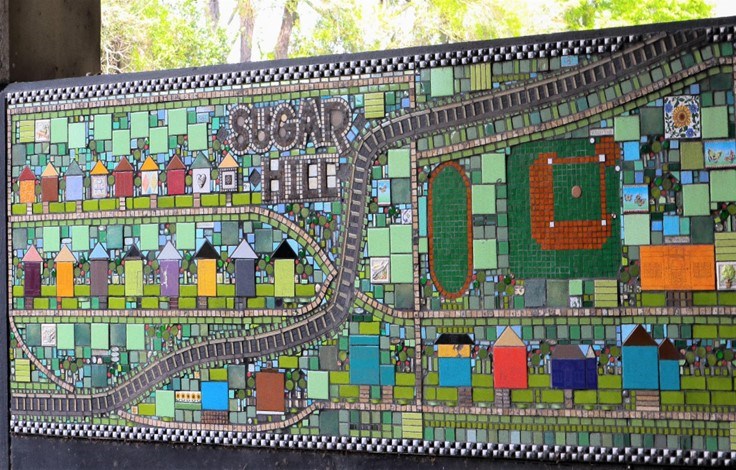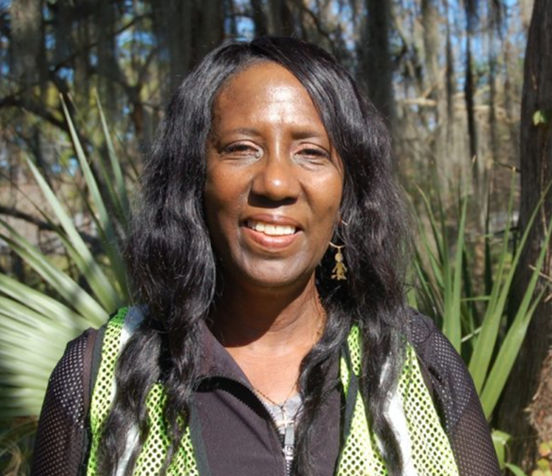Last updated: January 22, 2025
Article
Community Development: Creating local opportunity through the Emerald Trail and restoration of Hogan and McCoy Creeks

NPS Photo
GROUNDWORK JACKSONVILLE
Jacksonville, the most populous city in Florida, features numerous historic neighborhoods, some of the area’s oldest parks, and miles of rivers, creeks, and wetlands. One of its most notable neighborhoods, Sugar Hill, was once the epicenter of black prosperity in Northeast Florida, home to many prominent individuals, gracious homes, and thriving businesses.
Desegregation, urban renewal, and the construction of Interstate 95 largely destroyed the neighborhood in the 1950’s and 1960’s. Wilder Park, a signature 30-acre space with a public library, track, baseball diamond, and community center was taken over by the highway project. For over 50 years, a municipal solid waste incinerator operated in the neighborhood, leaving much of the surrounding area a designated brownfield site. City-wide, two major creeks, McCoys and Hogans, suffered from years of neglect. McCoys Creek, channelized and buried in sections during a City Beautiful movement, is inaccessible and prone to flooding; the Hogans Creek flood plain is overdeveloped and contaminated in sections adjacent to industry.
Groundwork Jacksonville was established in 2014 to help plan and execute a transformational city-wide project — to build an expansive trail system, restoring these two creeks in the process. Scheduled to be completed by 2029, the Emerald Trail will be a signature outdoor destination encompassing 30 miles of trails, greenways, and parks that encircle the urban core and link at least 14 historic neighborhoods like Sugar Hill to downtown, Hogans Creek, McCoys Creek, and the St. Johns River.
This project has enormous potential to drive social and economic development in Jacksonville— from encouraging healthy lifestyles and promoting public safety to spurring economic growth and neighborhood revitalization. A major connector for residents and an attractive destination for visitors, the Emerald Trail will link 16 schools, two colleges, 21 parks, and countless restaurants, retail stores, and other small businesses. Thirteen additional schools and 17 parks will be located within three blocks of the trail.
An undertaking of this size and scope requires a great deal of thoughtful planning and intentional collaboration — especially with residents and small business owners. Throughout the planning process, Groundwork Jacksonville met with community leaders and residents to understand their needs and ensure that their preferences be included in the trail, putting into practice their motto to do projects “with” community and not “for” the community.
“Our overlying direction for community engagement is to equip the community with information about our projects, to listen to their concerns and ideas, and to respond. We are saying ‘you are heard’ with our actions. This helps ensure that our projects are aligned with the priorities and visions of the communities we serve. The community’s number one concern related to the Emerald Trail is housing, followed by economic opportunity. The community wants to see improvements in their neighborhoods but does not want to be displaced because of those improvements. Addressing those concerns is a cornerstone for our work.”
Gloria McNair, Manager of Community Engagement and Equity, Groundwork Jacksonville
A sustainable equitable development strategy is key to the success of this expansive, transformational project. In response to resident concerns, and in an effort to avoid past mistakes, Groundwork Jacksonville has prioritized “withintrification”, where community investments are led by the interests of current residents (as an alternative to gentrification, where interests lie with outside developers, often at the expense of displacing current residents). They are finding ways to address community concerns around affordable housing, small business resources, and infrastructure improvement. Understanding that the community seeks to create job opportunities for the community -- especially youth and young adults -- while strengthening cultural and environmental stewardship, Groundwork created programs like the Community Restoration Environmental Stewardship Training (CREST) and Emerald Trail Stewards. Emerald Trail Stewards, a six-month job training program for residents of the Emerald Trail neighborhoods, provides on the job training in green infrastructure and landscaping design and installation. Participants are certified as clean water, horticultural, and landscape professionals, and receive support to find jobs in these fields.
No one organization can accomplish work like this on their own. Groundwork Jacksonville has also built a coalition of partners who can complement their own capabilities. For instance, they are working with Local Initiatives Support Corporation Jacksonville (LISC), North Riverside Community Development Corporation, and Three Rivers Legal to build and sustain local economic power. These partners are helping residents gain clear title to property and create wills or living trusts to ensure that property stays with beneficiaries. They provide educational resources for financial counseling and home ownership and offer support to help low-income residents pay property taxes. In addition, Groundwork recently received a housing repair grant that will allow them to assist residents with home repairs, reducing health and safety issues and barriers to home ownership.
“Overall, I see Groundwork Jacksonville as the organization that influences and leads equitable development in Jacksonville. Viewing community development through an equity lens will become the norm for other agencies because we have shown how it can be done effectively.”
Gloria McNair, Manager of Community Engagement and Equity, Groundwork Jacksonville

Interview with Gloria McNair, Manager of Community Engagement and Equity
What is Groundwork Jacksonville’s approach to Community Engagement?
Our engagement strategies are centered on building trust and relationships. We show up everywhere — from neighborhood events to Community Development Corporation gatherings. Our approach centers on a continuous process where we maintain engagement beyond initial projects. People now recognize me at community meetings and ask for updates on projects, furthering a balanced relationship of receiving and responding to input. Our approach for community engagement is to equip the community with information about our projects, listen to their concerns and ideas, and respond to those concerns and ideas. We are saying you are heard with our actions. Our approach helps to ensure our projects are community centered and aligned with their priorities and visions.
What are some of the community concerns and needs brought to Groundwork Jacksonville’s attention through your community engagement work?
The community’s number one concern related to the Emerald Trail is housing, followed by economic opportunity. A community wants to see improvements in their neighborhoods, but of course does not want to be displaced because of those improvements. So, working against displacement and working with the current residents to keep them there is a cornerstone for our work. They also want to see our organization provide economic opportunities for the community as a whole, with a focus on youth. We have also identified interest in strengthening cultural and environmental stewardship opportunities.
What has been Groundwork Jacksonville’s response to those interests and concerns?
So far Groundwork Jacksonville has created an equitable development strategy to address affordable housing, small business resources, economic opportunity, infrastructure improvement, and workforce development targeted for the under-resourced neighborhoods we work with. Many of these strategies for workforce development are already underway with our Green Team, CREST, and Emerald Trail Stewards programs. The Emerald Trail is also being built with economic opportunities for the community in mind, and we are doing work to support withintrification.
Can you tell me more about Withintrification?
‘Withintrification’ is an anti-displacement strategy used by Groundwork Jacksonville and our Historic Eastside partners. This term describes community investments led by the interests of current residents as an alternative to gentrification, where interests lie with outside developers, often at the expense of current residents. The goal is to have community improvement projects without the displacement that gentrification is likely to lead to. Learn more here: Gentrification vs. Withintrification in Jacksonville (thejaxsonmag.com)
Who are your partners in this work?
We are working with the Local Initiatives Support Corporation Jacksonville (LISC), North Riverside CDC, and the Historic Eastside CDC to invest in current residents. LISC Jacksonville and Three Rivers Legal help residents gain clear title to property and create wills or living trusts to ensure property stays with beneficiaries, and they offer educational resources for financial counseling and home ownership. They also have a program to help low-income residents pay their property taxes. We just received a home repair grant that could play another part in keeping residents in their homes as well.
What advice do you have for others wanting to be more engaged in anti-displacement work?
Learn what is most important to the neighborhood by spending time getting to know the residents. In order to gain community trust, be honest and transparent about your intentions. And develop a toolkit of resources and contacts to assist communities with their goals.
In the future, how do you see Groundwork Jacksonville growing in community engagement and anti-displacement work?
I envision that all residents of the Urban Core will have the opportunity to share their goals and dreams for the Emerald Trail segments connecting their neighborhoods. Overall, I see Groundwork Jacksonville as the organization that influences and leads equitable development in Jacksonville. Viewing community development through an equity lens will become the norm for other agencies because we have shown how it can be done effectively.
GROUNDWORK JACKSONVILLE
Established: 2014
Learn more about Groundwork Jacksonville’s approach to equitable development:
